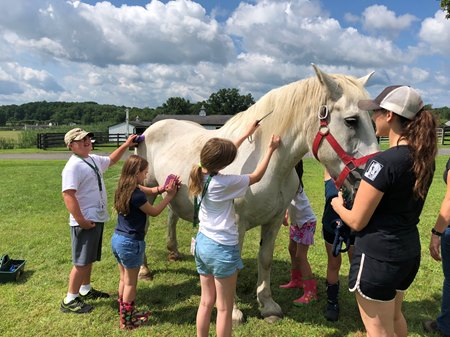Is it possible to teach humans how to be compassionate caretakers of horses?
That’s what Thoroughbred Aftercare Alliance-accredited Equine Advocates near Chatham, N.Y., is working on. The 22-year-old nonprofit organization operates as a sanctuary and rescue, serving all breeds of equines, with an emphasis on humane education.
“We wanted to focus on education because we feel that the best way to help horses is to help people better understand them,” said Equine Advocates founder Susan Wagner. “In 2006, we built a Humane Education Center on the sanctuary grounds. Since then, we’ve had many different kinds of classes here for a wide variety of groups—school groups, senior groups, national children’s organizations, 4H.”
Since launching the program in 2006, Wagner and her team have hosted thousands of students. They hit a turning point last fall when humane educator Colleen Cronin joined the team, allowing the organization to serve more students on a regular basis and develop a curriculum based on grade levels. With Cronin on board, Equine Advocates had more than 300 elementary school students, plus pre-K and special education students, come through their doors in the fall of 2017 and spring of 2018.
Wagner said the organization will extend its program to middle and high school students as well.
“Ultimately, our goal is to make our lesson plans available to schools all across the United States. We are very passionate about the need for humane education in this country and wish to share what we are offering here at Equine Advocates to students and teachers everywhere,” Wagner said.
Those lessons happen both in and out of the classroom at Equine Advocates. The Humane Education Center has a large classroom, where lessons begin before continuing outside for students to get a tour of the farm and its equine residents.
“We really want kids to understand that horses are animals that have special needs,” Wagner said. “As big as they are and as powerful as they are, they are very dependent on us. So it’s up to us to be responsible and provide them what they need. It doesn’t have to be fancy, but they have certain needs that they require in terms of their nutrition, their shelter, their access to water, their handling and grooming, and their needs for regular veterinary care, farrier care, and dental care.”
Not only that, but Equine Advocates wants future horse owners to make responsible decisions when purchasing a horse.
“I think they come away with the understanding that it’s a big responsibility to have a horse. It can be a 30-year commitment, and if for some reason along the line one cannot keep the horse for 30 years, that person needs to make sure their horse is placed in a safe and kind home. You can make that case for any animal—once you have an animal under your care, you are the responsible caretaker for that animal.
“These young people are the future horse owners of America. I think it’s very important as a humane organization that people are educated about taking care of horses and what’s involved. And also to understand why they should consider taking a rescued horse or a horse that’s had a second career, and why that can be very fulfilling because you’re helping a horse that needs a home.”
Rick Sutton, former assistant principal at the Mary E. Dardess Elementary School and current principal at Titusville Intermediate School near Chatham, has sent approximately 300 students through the Equine Advocates program and plans to make it a regular part of his school’s curriculum.
“I think it’s part of a well-rounded education,” Sutton said. “It’s really important for kids to understand who to protect and what it means to have a conservationist point of view and a conservationist mind. Our students really took to the lessons, and for some of them, it was a new concept—to protect our animals, to take a look at how animals are treated, and take that into a larger context in their life, too.”
And even though a lot of students in the area had experience being on a farm, not all of them had necessarily thought about the care that goes into being the guardian of a large animal.
“For our students, being a rural school district, many of them already had experience in a farm environment, but there’s a large percentage of our population that didn’t really have that experience,” Sutton said. “And to just gain the foundational knowledge is going to help them. I think that’s really what our students gained the most.
“The whole humane education curriculum was great. The experience of seeing the live animals, putting faces to exactly what the concepts were. Everyone has seen and heard ‘save our animals’ and ‘respect nature,’ but until you actually see those horses’ faces, it doesn’t quite put it into context when you’re 11 years old. To see it through that lens, it was really a powerful experience for our students, and it was done in a tactful, age-appropriate way.”
For Wagner and the Equine Advocates team, it’s about more than just helping students understand. It’s about impacting future generations of decision-makers.
“This experience has been extremely rewarding,” Wagner said. “I’m very excited to watch this program continue to evolve. I feel that we’re not just helping students understand horses better, but we are helping horses by having people understand what’s involved with their care, their special needs, and the issues that affect them. We also give students the tools to be able to go out and rescue their own horses. It is so important to encourage people to be proactive, such as recognizing if a horse is in distress and whether it is due to a medical or a cruelty issue.”
PHOTO: Equine Advocates














